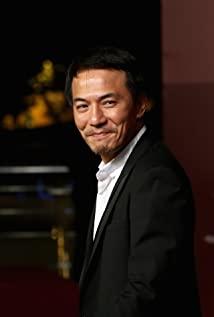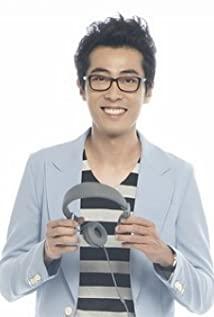In mid-March, "The Name Inscribed in Your Heart" held its world premiere at the Osaka Asian Film Festival in Japan. Due to the spread of the epidemic, the film festival has also been greatly affected, and the Q&A session was forced to cancel. But the director of the film, Liu Guanghui, still came to the film festival and watched the world premiere with the audience. I was fortunate to have a long conversation with Liu Guanghui in Osaka. Below are the details of the interview.
~~~ (The interview was first published on the Japanese media "Movie.com" (partially reproduced, please indicate)~~~
The creative background of the film
Liu Guanghui: The background of the creation, it is actually a story of my own high school days. In some circumstances at the time, things like liking boys were not allowed. At that time, Taiwan was also in the era of what we call "martial law". If we talk about the mainland audience, it was an era of Jiang's family. It is a bit like a special symbol of authority in the Republic of China, so under the atmosphere of that era, many things were suppressed. Human emotions and human thoughts are suppressed. Exactly at that time, because Mr. Chiang Ching-kuo passed away. After his death, Taiwan was lifted. People will tell you that in the future you can, for example, grow your hair longer, even when we are studying. Then, for example, there are more news and newspapers, and some folk voices can express their opinions more freely. In this context, what does love look like? Yes, because I have been through such an era myself. Last year, Taiwan passed the same-sex marriage. It has been 30 years since the era of martial law, and Taiwan has come to such a point, so I think it is not easy to let young friends know about this process. Of course, the people of this ethnic group who grew up in Taiwan, I feel very lucky to be able to meet such an era. However, there are some friends of these ethnic groups who may be older. They are actually a little bit by this era... How should I put it, because they may not have caught up with this more beautiful and friendly era, so I hope this story can also tell these people some voices.
About "Martial Law"
Liu Guanghui: "Martial Law" actually means that the Chinese Kuomintang moved from the mainland to Taiwan back then. After that, they wanted to control the people in Taiwan, so they promulgated the so-called "martial law". Including, for example, you can't meet on the road at what time in the evening; then you have to obey many so-called state decrees; for example, what books you read, there are many books that are banned and cannot be read; and there are many languages, you criticize some In fact, political matters are not acceptable, there are many backgrounds. This martial law has been implemented in Taiwan for about 30 years, and it was only in 1987 that the ban was lifted, like this. So it is such a background of the times. Only after that did people seem to be free to do something about it, like this.
Think back to the "martial law" era
Liu Guanghui: If it is about martial law, because I knew that such a thing existed when I was a child, but it really had an impact on me...because you think it is something that you should not do, you just think To collide, there will be such a mentality. Will run out, especially wanting to ram it. No, it tells you not to go east, but you want to go east, as if you have a bit of this mentality. Then when it tells you that you can go east, you say there is nothing to go east. This kind of thing is often like that, the more it suppresses, the more you want to resist. So there might have been such a reactionary atmosphere throughout that time. For example, it tells you what kind of books you can't read. For example, we can't read Mao's books, but you will want to know what kind of person Mao is, so you will read them secretly.
Research materials before shooting
Liu Guanghui: There are some LGBT groups in Taiwan, so we interviewed many people through them. In addition to the older ones, there are also younger ones. There is even one... That is to say, if comparing Taiwan's works in this area, the earlier one is "The Evil Son" written by Mr. Bai Jin Yong, which is actually a story of gay love in the era of martial law. So it actually contains a lot of the so-called martial law period, a social atmosphere in it. After we did these visits, we also did a lot of historical factual investigations. For example, there was a very important pioneer of the gay movement in Taiwan at that time, Mr. Qi Jiawei. We also put the background of this Mr. Qi Jiawei here. In fact, at that time, in the 1980s, he was wearing clothes made of condoms and holding a sign on the road. He just wanted to tell the society: homosexuality is not a disease, it is not a disease. We also put this historical background into it. Then we actually had a discussion with Mr. Qi Jiawei, and he was willing to let me put his background, so today we also pay tribute to these pioneers of the gay movement.
Legalization of same-sex marriage in Taiwan in 2019
Liu Guanghui: Actually, the Taiwan government announced that comrades can get married, which caused a great confrontation in Taiwan society. There are many older people who are very unacceptable to such a thing. So at that time, Taiwan held a referendum, saying that I would not. I hope gays can get married, and 7 million people in Taiwan voted for this. However, the government believes that this is a right of human beings, so it is put before the law, and the law can be established by means of administrative legislation. So we're actually very grateful, actually doing this very bravely. In fact, this opposition still exists today, but it is actually a bit like an intergenerational problem. In Taiwan's current society, for example, people over the age of 50 may not be able to accept such a thing. However, young people in their 20s and 30s feel very good. They like whoever they want. So it has become a generational confrontation in Taiwan. This is still going on, and it still exists. The gay movement in France and the United States has gone through such a process. There are oppositions in society, and many oppositions come from religion, especially some conservative forces of Catholicism or Christianity. The background of my story is because I grew up in a Christian family, so I know very well what that pressure is, not just life, classmates, but also the pressure of a god watching you. Some priests tell you that this is not acceptable and that is not acceptable, so such a story was made under layers of pressure.
The idea of the script (before same-sex marriage was legalized)
Liu Guanghui: I started the idea before the decree was issued. The earliest idea is about three years ago. At that time, Taiwan was already in a... At that time, the young gay community in Taiwan thought it was impossible, and this law was impossible to pass. Therefore, these comrades, they also took to the streets to protest, and said in front of the Legislative Yuan in Taiwan. Then the next day, some other opponents also went to the same place to say that we were against you, and it went back and forth for a long time. At that time, we felt that the social pressure was too great, and that this law was impossible to succeed. But there is a very important thing, that is, there is a meeting of justices in Taiwan, they decided to say that this is the basic right of the people, and it is the right of the people that should be guaranteed in the constitution, so you should not use your prejudice to interpret this law . OK, so the justices made this explanation. After he made this explanation... all laws are inferior to the constitution, the constitution is the biggest, so this bill was passed.
Changes to the script (after legalization of same-sex marriage)
Liu Guanghui: After passing it, we actually put a relatively large connection. There is a priest in us, and this priest came to Taiwan about 30 years ago. At that time, some missionaries came to Taiwan to preach, some were doing education work, and some were doing medical work. When the priest left Canada, a "quiet revolution" was taking place in Canada. At that time, Canada, especially the French-speaking part of Quebec, was controlled by the church in all administrative systems, educational systems, medical systems, and so on. It is also a law that God is in charge of this place. So they launched this quiet revolution at that time, and they said that we should protest these things quietly and quietly, and we should no longer let people of these religions control our rights. The quiet revolution they launched was a success. After the success of the revolution, these church groups withdrew from Canadian politics. This priest, because his sister in the story is also a comrade, but he did not catch up with this beautiful era. He felt that the era was too oppressive and wanted to escape, so he came to Taiwan. He preached, and actually felt that he was a priest, but if he had a boy he liked, the pressure would be too great. When he went to this school, he found that Ahan also liked the character. He asked Ah Han not to be gay, and told him that you should not be gay, it was too hard. But he did not expect that in that year, he witnessed the revolution of Jie Yan. He felt that this was no longer something that God and God couldn’t hold back. If you love it, it will grow, and whoever you like is beyond your control. Therefore, the role of the priest and the role of Ahan are one of the so-called quiet revolution experienced, and the other is the lifting of the law. Two very cleverly made an era connection here like this.
Homosexual Movies and Taiwan
Liu Guanghui: Yes, I think because Taiwan is a relatively free environment after all. Although there are only 23 million people in Taiwan, there are actually many ethnic groups. You know that there are ethnic groups from other provinces, there are various ethnic groups from Taiwan's aborigines, and with the collision of different cultural values, there are quite a few things that everyone wants to talk about. So, that environment, I think, is very encouraging for this kind of creation. Especially in a situation like a few years ago, the subject matter of talking about comrades was still relatively depressing, and now it just happened to be like this. But we actually got some distractions while making this movie. For example, if we are going to find a sponsor, they will say that maybe we are not willing to touch the gay theme and so on. So although the law has been passed, the whole society has to keep up with it.
Shooting process
Liu Guanghui: There are many religious scenes in the film. I remember we went to borrow the church where the priest was, and later he found out that we were filming this. When we borrowed from him, we didn't actually tell him. We said we were going to make a campus movie, which happened to be a Catholic school, and said that we thought your church was very beautiful, so we borrowed it. It was a church in the countryside of Taiwan, and one of the elder brothers in charge of the church said to come and have a look. Then he patted us on the shoulder and said, just go and pat us. I think that is particularly moving, like this. The bishop above them didn't know about this matter. It was a bit like this, and there was still some pressure.
About casting
Liu Guanghui: Because we had to be high school students, it was very troublesome at the beginning. When it comes to casting, there are very limited actors to choose from. Probably you know a little famous, he may be twenty-four or five years old. Visually, it will still be a little bit... that is to say, you have to pretend to be small, and I don't really want that, so after we chose a circle, we saw Chen Haosen. We first got in touch with Chen Haosen, and then we knew that he played some kind of rotten drama. I said he was quite handsome, so I asked him to chat. After we came to chat, we said it looked like Takeshi Kaneshiro. But I think apart from that, he has a very, very special background - he also has gay relatives at home. At first, he was very unable to understand why his family liked the same sex, so he was very resistant. Until finally, his family had a reconciliation, and he also knew that they were actually very ordinary people. He shared this personal experience with us, and I said he was very suitable for this role, so we decided to play Chen Haosen.
Then there is the role of Jing Hua. We want to match Chen Haosen, and the appearance is also very important, because of this. And then at that time, I hadn't found a suitable one, and none of them felt like it was his at first glance. Then we heard that a newcomer had just finished "Homecoming", but at that time Homecoming hadn't even started. We just said yes, then we'll invite him to audition. When we first started chatting with us, we chatted like this, he didn't dare to look at me, he just looked down. We asked him something, and he thought about it for about two minutes before "Oh, oh, ok", and that response was very delayed, and we thought, God, can he act like this? Later, his agent communicated with us, because he was not familiar with this circle, because he was a newcomer. It was because he was spotted by Sister Li Lie and then acted in Back to School, so he actually has a relatively simple life background, yes. Later we asked him to try a scene, and he did very well. We can say that there is a contrast in his personality. We thought that he could play the role of Birdy, which is probably the process.
After we found two young handsome guys, then we had to find old handsome guys. That old handsome guy has to be in movies, but in fact, there are very few. You also have to be handsome, which is a little more difficult. Dai Liren is recognized as a handsome guy. On the one hand, he is my junior brother, but he is actually older than me. Because he finished his military career, he went to our Taipei University of the Arts later. Then I just wanted to say, then ask Kan Liren if he wants to play Ha, Big Brother. Then I asked, and he said, "Well, okay," and he was willing to act. We were especially surprised because he had never played such a role before, he used to play such a tough, kind of role. I just talked to Brother Dabao. When we were in the University of the Arts, there were actually a lot of gay people. In school, he has already seen nothing wrong, so he has a lot of people to refer to and some examples of performances that he can use. Yes, so Big Brother has settled down. The next step is to order Birdy, which has also gone through a lot of twists and turns. I asked a lot of people, but I can't say. For example, I asked Jerry Jerry if he wanted to act like this, and he just found a circle. Of course, these are unlikely, too dreamy this list, and later asked Zhixian like this. Wang Shixian also wants to try some different roles. Because he used to play some kind of underworld boss, and then he was a policeman, such a very hard role. We don't know if there is any spark when we put the two old men together. We think the performances of both are very good. Li Ren has a lot of details, it just makes us all smile. When I was in the theater just now, I saw everyone looking back at him, and everyone was so happy.
Responses from various places (the interview time is March, Taiwan has not yet officially released)
Liu Guanghui: At present, it is because of participating in the film festival. I went to Berlin and the market exhibition before, and did two test screenings. In fact, many people are very concerned about this film, and the feedback is very good, giving us a lot of feedback. Many girls watched this movie, and they felt very moved. They said that these two had to fall in love because they were so handsome. Handsome, of course, but this is a gay story, we hope to convey this love thing. That is to say, love is not divided into genders, it is not divided into ethnic groups. When love happens, you should be brave. This era also allows you to be brave, and I hope everyone can talk about a vigorous first love. Talk hard even if you don't succeed.
In addition, because there were some gay movies in the past, it just made you think that this is a gay movie. We were very worried, because many people knew it was a gay movie, and then I didn't want to watch it. Judging from the feedback from our test screening, we all felt that even non-comrades would like this movie, and I hope it can be like this.
World Premiere at the Osaka Asian Film Festival
Liu Guanghui: I just came out of the premiere. I was very nervous at first, and then, just now, the organizer told us that our tickets were actually sold out, like this. I said, "Wow, really?" Then it was raining again, and I saw everyone lining up over there, and I actually started to get a little emotional, a little excited. Wow, so everyone is still willing to come and see, if I definitely don't come here, I will feel this way. I saw everyone lining up like this, and then came in. During the live screening, I wasn't really watching the movie, I was watching how everyone responded. I heard the sound of sobbing from the nose here, I wanted to say if my breathing was not good or something, and then I looked as if someone was wiping tears, what or what. It seems that the whole atmosphere should still be quite moving. I just feel very grateful that they can give us such a good response like this.
Taiwanese Films and Mainland Films
Liu: I think the influence of mainland movies on Taiwan is actually not that big, because in fact, Taiwanese basically watch less mainland movies. Some film exhibition works, such as Jia Zhangke's films, if it is in the film industry, everyone will pay attention. Like I remember Jia Zhangke's "Apocalypse", its premiere was actually in Taiwan, because it doesn't seem to be available in China. Later, some movies, such as those directed by Zhang Yimou, were actually watched, but the audience was relatively small. And now because of these OTTs coming in, like Netflix coming in, for example "Youth as a Teenager" or "Later Us" by Rene Liu, they go directly to OTT. On the contrary, through such a channel, people can directly see some excellent works in the mainland. As far as the film industry is concerned, I think they all have to talk about their own themes. I think it's like "Youth as a Teenager", which also came to Osaka this time. I think it's a very, very good work. I watched it myself and thought, "Wow! It's amazing." It's actually a mixed-race movie, made by a Hong Kong director and a Hong Kong team.
Liu Guanghui and Japan
Liu Guanghui: When I was young, when I was still a so-called literary youth, I just watched Akira Kurosawa and Yasushi Ozu. Everyone went through a period like this. In the past few years, there was a time when I really liked the works of a man named Tetsuya Nakajima, who did that "Confession" and "The Life of the Disgusting Matsuko". In the beginning, it was a movie called "The Story of the Lower Wife", which was played by Kyoko Fukada. His vision is very beautiful, because he is a director of advertising. In recent years, of course, it has been Hirokazu-eda. He is also very famous in Taiwan's literary and youth circles. I also like Hirokazu-eda's works very much. It was Director Hirokazu Koreeda who also said that he was influenced by Hou Hsiao-hsien. I think the movie is something that a different generation sees with each other. In fact, the exchanges with each other are very interesting. So I'm also influenced by these things myself. I think that because Japanese culture is derived from Chinese culture, I thought at the beginning, hey, why is the interpretation of Japanese characters different from ours? It could be a little more classical, or something. Why can new and Western things come in from a cultural background like Japan? Its katakana will never be finished, and new words will always appear. However, there can be such a kind of beauty of classical fusion. So I think Japanese culture is very inclusive, and I think this kind of culture can live very strong. Culture should be more inclusive, but its own roots have to be found.
View more about Your Name Engraved Herein reviews











